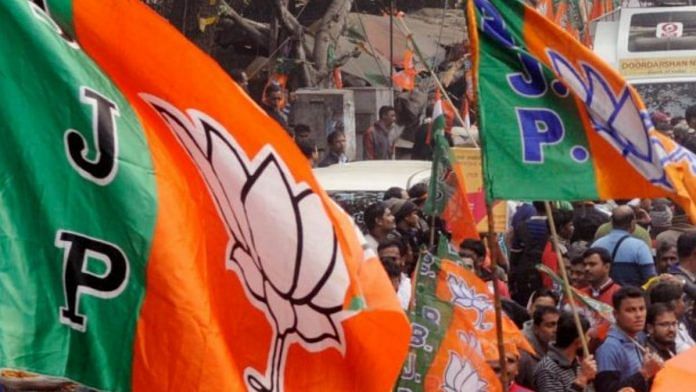
Patna: A transfer-and-posting scandal has hit the Nitish Kumar government in Bihar, with one of his ministers publicly threatening to quit for his inability to transfer officials and BJP MLAs accusing ministers of their own party of making money in this exercise.
On Thursday, Minister for Social Welfare, Madan Sahni, who is from Kumar’s Janata Dal (United), threatened to resign due to the “dictatorship” of his Principal Secretary, Atul Prasad.
The move came after Sahni couldn’t transfer officials in his department due to Prasad’s objections even as 2,000 state employees — including block development officers (BDOs), Circle Officers (COs), engineers, social welfare officials, and land revenue officers, etc — were transferred between 23 June and 30 June.
Wednesday was the last day for transfers this year at the departmental level. Any transfer at a later date would require the chief minister’s approval.
The entire transfer-and-posting exercise has now become mired in an alleged corruption scandal, with several legislators, including ruling BJP MLAs, accusing ministers of making money in return for choice postings.
“The BJP ministers have earned to the tune of Rs 100 crore through these transfers. Even some JD(U) ministers have earned crores. CM Nitish Kumar should put a stay on these transfers. All criteria of transfers have been thrown to the wind,” BJP MLA Gyanendra Singh Gyanu told ThePrint.
The price quoted by MLAs for transfer varies from Rs 4 lakh to Rs 50 lakh, depending on the place of posting, Gyanu claimed.
Another BJP MLA, Haribhushan Thakur, alleged that money was the only consideration for transfers. “What can you expect from officers who have paid ministers and the higher officials for the posting of their choice?”
The opposition also joined in to corner the CM. “The Nitish Kumar government has made transfers of officials a lucrative business. The suggestions of legislators have been completely ignored,” said Rashtriya Janata Dal MLA Bhai Virendra.
Amid the allegations, the Bihar education department Thursday put on hold the transfers that it had notified just 24 hours earlier.
Also read: There is a reason why not many quit BJP, and it’s not just power
What Sahni claimed
On Thursday, Minister for Social Welfare Madan Sahni, an EBC face of the JD(U), declared that he would quit.
“There is dictatorship by the top official in my department. I have tried to fight it but nothing is working. I did not come here just for ministerial perks,” Sahni told ThePrint.
Sources in the social welfare department said that Sahni wanted a mass transfer of his officials. However, Principal Secretary Atul Prasad refused to oblige, saying that many officials hadn’t completed their three-year tenure in their present postings.
Sahni, who was minister for food and civil supplies in the previous Nitish government, had demanded the removal of his top official, Pankaj Kumar, in the previous tenure. CM Nitish Kumar had obliged then.
Also read: How ex-ABVP leader Revanth Reddy became Telangana Congress chief in just 4 yrs of joining
How transfer process works in Bihar
According to former Bihar Chief Secretary V.S. Dubey, MLAs always want their men to be posted as COs, who deal with local land issues, and as BDOs, who ensure implementation of government programmes, and other such posts.
The intervention of MLAs in the transfer of such posts is as old as independence. But until 1970 it was so peripheral that nobody noticed it. After 1970, there was a surge and at least one minister started taking money and getting his own men in key locations, claimed Dubey.
In 1982, the state moved to check this trend, forming establishment committees headed by the principal secretary of the department concerned to take considered views on transfers depending on how long the officer has served his present posting, any corruption charges, among others, he said.
The panel is mandated to finalise the list and send it to the concerned minister. The minister is supposed to approve it with no or minor changes.
“But, if the minister makes a major change, the principal secretary is entitled to send it to the chief secretary with his objections. The chief secretary sends the file to the CM’s office. It’s the CMO that makes the final call,” added Dubey.
Over the years, officials themselves started to approach MLAs, ministers and even CMs, in some cases, and exchanged loyalty and money for choice postings. “Over time transfers and postings have become an industry,” said Dubey.
The present crisis stems from the conflict between ministers, who want to oblige MLAs, and principal secretaries, who are refusing to comply.
Skating on thin ice
Chief Minister Nitish Kumar used to ignore such corruption allegations earlier as he had huge power margins over the opposition.
However, this time his government has a thin margin — 125 in the House of 243 (there are two vacancies due to the death of JD(U) MLAs), and so he cannot afford to ignore his MLAs and ministers.
“Earlier, Nitish would have asked the MLAs and ministers to take a walk,” said a JD(U) leader, who stressed that the CM hasn’t ruled Bihar with such slim margins earlier, with his ally BJP being bigger than him.
(Edited by Amit Upadhyaya)
Also read: Not panna pramukhs, it’s panna panels now: How BJP plans to expand reach in 5 poll-bound states
Subscribe to our channels on YouTube & Telegram
Why news media is in crisis & How you can fix it
India needs free, fair, non-hyphenated and questioning journalism even more as it faces multiple crises.
But the news media is in a crisis of its own. There have been brutal layoffs and pay-cuts. The best of journalism is shrinking, yielding to crude prime-time spectacle.
ThePrint has the finest young reporters, columnists and editors working for it. Sustaining journalism of this quality needs smart and thinking people like you to pay for it. Whether you live in India or overseas, you can do it here.





